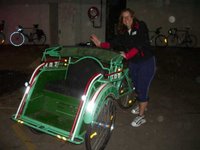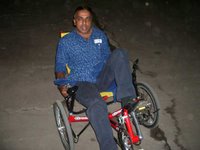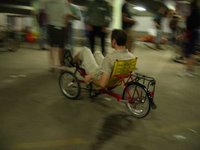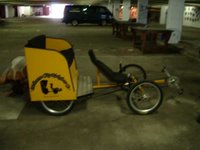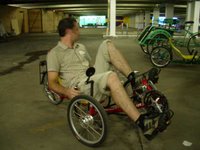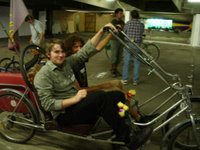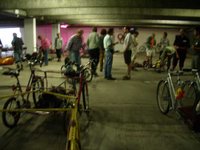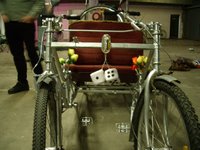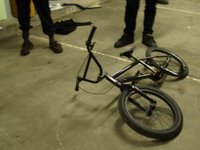Notes on the Speakers from Forum 1
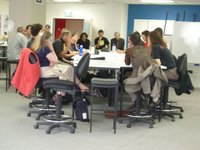
Frasier Brindly Councillor, City of Melbourne.“Melbourne is at a tipping point with transport”
- Need for structural change within the cbd to accommodate HPVs.
Key issues:
- Road Space allocation (dissporportionate amount of space given to cars)
- Need for a dedicated bike lane.
- Planning for dedicated bike parking
- Overcoming political and economic interests (60 million in revenue from car parking and fines)
Ben Goodall Designer and Director, Trisled Human Powered Vehicles“Improve public perception from a design perspective”
- If machines are designed simply and work effectively then people will respond positively
- Designers need to address major safety issues for work bikes eg. Braking capacity
- Users will respond towards Cenvenience, economics and fitness
Jared Osborne Policy Development Officer - Sustainable CommunitiesHow can policy with an imagination have social and political benefits?
How can we implement cultural change and appeal towards bikes?
Can bikes be given the same attention as cars in advertising and appeal to the same audience?
Rachael Carlyle Sustainable Transport Coordinator for Environment Victoria.20% of Car trips in Melbourne are under 1km.
Current Projects:
- Families of the future (encouraging families to ride with children – modifying their bike for safe travel)
- Cycling into a sustainable future (encouraging cycling in schoolchildren)
Emphasised the need for a moble bicycle repair unit.
Rob Moore Manager Urban Design, City of MelbourneKey points:
- Need for a significant shift in policy to reduce the cars in the city.
- Too much emphasis on motor vehicles in current design for public space.
- Using Road space to park vehicles isn’t sensible.
- Higher rates will counter lost parking revenue and in exchange we will get more space.
 Ian Simms CEO Greenspeed Recumbent trikes
Ian Simms CEO Greenspeed Recumbent trikesKey points:
- Why choose cars? Safety, Protection, fear and aesthetic desire.
- Greenspeed Rationale: Well designed, ergonomic vehicles that feel and look great so people will enjoy riding them. The Key is to tap into “desire”
- Incorporate bikes into the road planning. Dedicated bike lanes marginalise the bike user.
Darren Andrews Environmental Services - Green Collect- Recycling network offers new employment and support opportunities.
- Current system is hand trolley based with definite potential to pick up larger items if a cargo bike is designed.
Elliot Fishman - Institute of Sustainable TransportOpportunities for pedal powered vehicles:
- Bike Taxis: Additional revenue from advertising. Seniors discounts
- Mobile bike mechanics: Strategic location options. No property rental
- Café/food vendor: Well postioned, unique experience, able to sell in remote locations.
- Load bearing cargo bikes: Available for hire.
Potential for Bike Stations around the city:
- hospitality facilities ie. Showers, toilets, food
- workshop onsite
- centre for hire.
Restricting the access of motor vehicles will lead to more people friendly Cbd.
Problems:
- Insurance, Spped, Cultural impact, Safety.
Ian Christie Project Manager - Bicycle Industies AustraliaKey points:
- 1.2 million bikes sold annually in Australia.
- Appeal is for fitness health and recreation.
- Fear is due to safety concerns and lack of end-of-trip facilities.
- Impact of social status: hot sweaty work is not ideal.
Ride to work programs and Bike Education.
FORUM Tues 31 Jan
WHO NEEDS TO MAKE 'PEDAL-POWERED' WORK?
A forum setting the scene for pedal-powered work activity in Melbourne
WHEN: 9.30am-12.30pm Tuesday 31 Jan
WHERE: RMIT City Campus, Level 4, Building 87, 410 Elizabeth St
(nr corner A’Beckett St, above Hudsons Coffee)
WHAT: What are the problems and/or the possibilities of increasing a culture of pedal-powered work in Melbourne through pedicabs, cargobikes and trikes, vendor service cycles and bike trailers?
Are pedal-powered vendor services only for poor cities or for most-livable cities? Would increased workcycles have negative impacts on bicycle lanes and mixed road traffic, or would workcycles reduce traffic? Why haven’t pedicab services been able to successfully operate in Melbourne? Is the Australian licensing law limit of 200W electric power assist in the pedal cycle classification preventing the viability of load-bearing workcycles in Australia, or is there a lack of clever local approaches to powerful pedalling? What services could be provided in pedal-powered ways? Is pedal work dehumanising, or could it help build community connections? Has the baker’s delivery bike and the fruit & veg pedal-cart turned the corner to head back our way? Why pedal any harder?
A number of transport stakeholders will share their views on issues of pedal-powered work, followed by explorative discussions, including the participation of representatives from Vic Roads, Environment Victoria, Bicycle Victoria, local BUGS and the participants of the PPVW.
SPEAKERS:
1. Fraser Brindley - Councillor, City of Melbourne
2. Ben Goodall - Designer & Director, Trisled Human Powered Vehicles
3. Jared Osborne - Policy Dev’t Officer - Sustainable Communities, Victorian Local Governance Assoc.
4. Ian Christie -Project Manager, Bicycle Industries Australia (formerly of Christie Cycles)
5. Rob Moore -Manager Urban Design, City of Melbourne
6. Darren Andrews - Director - Environmental Services, Green Collect Limited
7. Ian Simms - CEO Greenspeed Recumbent Trikes & HPVs,
8. Elliot Fishman - Institute for Sensible Transport
PROGRAM:
9.15 coffee & register
9.30 introduction to the Pedal Powered Vehicle Workshop – Mick Douglas
9.40 8 speakers x 5/10 mins
11.00 morning tea
11.20 forum discussion 1: the barriers and limitations to a workcycle culture in Melbourne
11.50 forum discussion 2: the strengths and opportunities of a workcycle culture in Melbourne
12.20 summary of directions for further work – Soumitri Varadarajan
12.30 close
PEDAL VEHICLE DEMO Monday 30 Jan
Try this pedal-powered bike, trike, recumbent, velo…
A show, tell and pedalling start to the workshop with a range of vehicles to demo
WHEN: 10.00am-1.00pm Monday 30 Jan
WHERE: *** NOTE CHANGE OF VENUE ***
Collingwood Housing Estate underground carpark
Harmsworth Street, Collingwood (near SE corner of Harmsworth & Perry Sts, underneath the commission flats. Look for ‘PPVW’ signs.)
WHAT: A practical start to the 3 week workshop with a show and tell of different vehicles, to be taken for a ride to generate discussion.
SHOWING VEHICLES:
Ben Goodall - Trisled rickshaw & worktrike
Bill Bretherton - Indonesian becak (rickshaw)
Ian Simms - Greenspeed recumbent cargobikes
Brad Marmion – competitive racing wheelchair
Andrew Martin – blackrose cycles
Louisa Jenkinson & Paul Shub – theatrical bikes
Mark Homer – workcycle
Plus PPVW participants bringing vehicles
… and inviting interesting vehicles!
update on workshop events
The workshop is taking shape, amazing people are getting involved, an exciting working location is confirmed...
Here is a glance at what is coming:
A WORKSHOP DESIGNING AND BUILDING PROTOTYPE VEHICLES
30 Jan – 17 Feb, Outer Space Studio, Kensington
A team of 20 designers, bicycle industry workers, new-service entrepreneurs and sustainable transport advocates will be working together in an intensive hot-house environment to develop working prototypes that demonstrate the potential of pedal-powered vehicles, particularly a pedicab/rickshaw, cargo workbike, vendor service bikes, trailers and bike add-ons and theatrical bikes.
* * * * *
WHO NEEDS TO MAKE ‘PEDAL-POWERED’ WORK?
A forum setting the scene for pedal-powered activity in Melbourne
9.30am-12.30pm Tuesday 31 Jan, RMIT City Campus
A series of presentations by key transport stakeholders on the problems and possibilities of increasing pedal-powered culture in Melbourne through pedicabs, cargobikes, vendor service bikes, bike trailers, and theatrical bikes – to be followed by discussion. Presentations will be given by bicycle industry developers, local and state government representatives, service providers seeking vehicles, and sustainable transportation advocates.
* * * * *
PEDAL-POWERED – PUBLIC LECTURE
Two lectures sharing experiences in developing human-powered transportation projects in India, Indonesia, Africa & North America.
6.30pm Wed 1 Feb, RMIT City Campus
‘Rickshaws and Pedicabs: Solutions from the past for the future’ by Shreya Gadepalli, Designer and Technical Director with Institute for Transportation & Development Policy based in India.
‘Human Powered Vehicles: international insights’ by Matteo Martignoni, bicycle industry consultant and Vice President of the International Human Powered Vehicle Association based in New York.
Where: Casey Plaza lecture theatre, building 10
(enter via Bowen St, ground floor of white angular building with plenty of bike parking at front.)
* * * * *
HERE’S A PEDAL-POWERED POSSIBILITY
A public presentation and response forum to the Pedal Powered Vehicle Workshop
9.30am-12.30pm Fri 17th Feb, RMIT City Campus
A series of presentations of ideas that make pedal-powered work, including vehicle prototypes, with responses from invited key transportation stakeholders, including bicycle industry developers, local and state government representatives, service providers seeking vehicles, and sustainable transportation advocates.
* * * * *
RIDE-ON-DINNER
6pm Fri 17 Feb, departing from a secret inner city location
A caravan of bicyclists served a 3-course meal from pedal-powered kitchen vehicles in three different locations over the duration of a 3-hour evening inner-city bike ride. $10 per cyclist. Booking will be essential. More details coming soon.
* * * * *
PARADE AT THE SUSTAINABLE LIVING FESTIVAL
Sat 18 Feb, Federation Square
A parade ride, show and tell of the workshop’s prototype vehicles at the premium public Melbourne festival showcasing sustainability.
* * * * *


